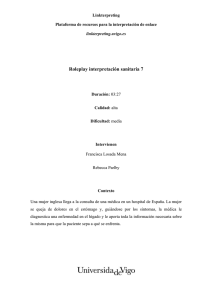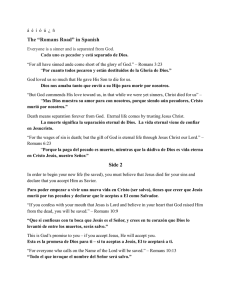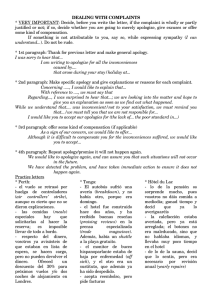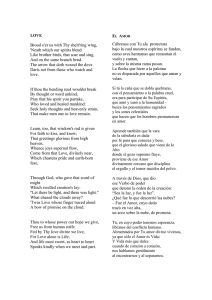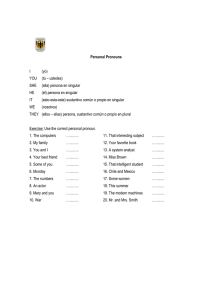NPM Houston May the Peoples Praise You
Anuncio
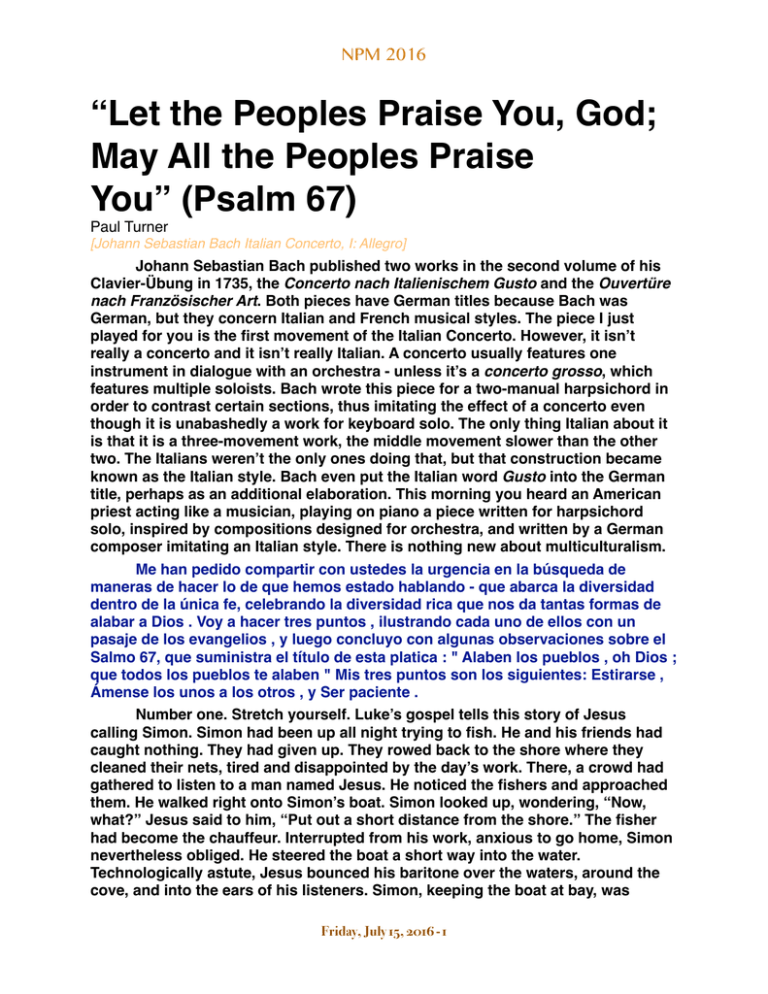
NPM 2016 “Let the Peoples Praise You, God; May All the Peoples Praise You” (Psalm 67) Paul Turner [Johann Sebastian Bach Italian Concerto, I: Allegro] Johann Sebastian Bach published two works in the second volume of his Clavier-Übung in 1735, the Concerto nach Italienischem Gusto and the Ouvertüre nach Französischer Art. Both pieces have German titles because Bach was German, but they concern Italian and French musical styles. The piece I just played for you is the first movement of the Italian Concerto. However, it isn’t really a concerto and it isn’t really Italian. A concerto usually features one instrument in dialogue with an orchestra - unless it’s a concerto grosso, which features multiple soloists. Bach wrote this piece for a two-manual harpsichord in order to contrast certain sections, thus imitating the effect of a concerto even though it is unabashedly a work for keyboard solo. The only thing Italian about it is that it is a three-movement work, the middle movement slower than the other two. The Italians weren’t the only ones doing that, but that construction became known as the Italian style. Bach even put the Italian word Gusto into the German title, perhaps as an additional elaboration. This morning you heard an American priest acting like a musician, playing on piano a piece written for harpsichord solo, inspired by compositions designed for orchestra, and written by a German composer imitating an Italian style. There is nothing new about multiculturalism. Me han pedido compartir con ustedes la urgencia en la búsqueda de maneras de hacer lo de que hemos estado hablando - que abarca la diversidad dentro de la única fe, celebrando la diversidad rica que nos da tantas formas de alabar a Dios . Voy a hacer tres puntos , ilustrando cada uno de ellos con un pasaje de los evangelios , y luego concluyo con algunas observaciones sobre el Salmo 67, que suministra el título de esta platica : " Alaben los pueblos , oh Dios ; que todos los pueblos te alaben " Mis tres puntos son los siguientes: Estirarse , Ámense los unos a los otros , y Ser paciente . Number one. Stretch yourself. Luke’s gospel tells this story of Jesus calling Simon. Simon had been up all night trying to fish. He and his friends had caught nothing. They had given up. They rowed back to the shore where they cleaned their nets, tired and disappointed by the day’s work. There, a crowd had gathered to listen to a man named Jesus. He noticed the fishers and approached them. He walked right onto Simon’s boat. Simon looked up, wondering, “Now, what?” Jesus said to him, “Put out a short distance from the shore.” The fisher had become the chauffeur. Interrupted from his work, anxious to go home, Simon nevertheless obliged. He steered the boat a short way into the water. Technologically astute, Jesus bounced his baritone over the waters, around the cove, and into the ears of his listeners. Simon, keeping the boat at bay, was Friday, July 15, 2016 - 1 NPM 2016 impressed with the voice, the medium and the message. In his moment of charity, escorting the preacher to his watery podium, Simon felt moved. Jesus concluded his discourse. Simon prepared to bring the boat back to the shore. But then the rabbi turned directly to him. “Put out into deep water and lower your nets for a catch.” Simon hesitated. He was not afraid of deep water. He lived on deep water. It wasn’t fear that froze him; it was disillusionment; it was exhaustion. “We’ve already tried that,” he said. “We have worked all night and have caught nothing.” But in spite of his frustration, obsessed with fishing, Simon took the bait. “At your command I will lower the nets.” He caught so many fish that the nets he had just mended nearly tore open again. Simon’s friends came to the rescue, but the quantity of fish nearly sank both boats. Trembling, Simon fell down to the knees of Jesus and said an anti-prayer - not the great prayer that concludes the Book of Revelation, “Come, Lord Jesus.” No, Simon said, “Depart from me, Lord, for I am a sinful man.” Jesus saw something else on Simon’s face: He saw fear. “Do not be afraid,” he said. “Do not be afraid.” Cuando llegué a ser pastor de la Iglesia Católica de San Antonio en Kansas City Missouri hace cuatro años, sabía suficiente español para empezar, pero no lo suficiente para hacer todo lo que la comunidad necesitaba. Como Simón, yo había puesto hacia aguas más profundas, las encontré lleno de trabajo, y descubrí que no podía coger el pescado por mi mismo. Necesitaba nuevas habilidades, y necesitaba ayuda. También descubrí una población vietnamita, pequeña pero robusta. Hace años, ellos habían puesto a cabo en aguas más profundas de las que yo tenía, unos refugiados injustamente privados de su tierra natal. Algunos de nuestros vietnamitas hablan Inglés, pero muchos no lo hacen. Ninguno de ellos habla español. Uno de los miembros más antiguos de nuestra comunidad angla me desafió: "¿Cuándo va alcanzar un sacerdote de aquí a los vietnamitas?" Yo tenía un tiempo bastante difícil con el español. Pero después de un año y medio, cuando sentí que mi español había mejorado, bajé una aplicación electronica para ver la lengua vietnamita por primera vez. Reconocí la mayor parte del alfabeto a excepción de las tildes. Descubrí que la gramática era más fácil que en Inglés y Español. Pero vi que el vocabulario no se parecía a ningún otro idioma que había estudiado. Los vietnamitas también tienen un sistema impenetrable de decir las palabras simples "yo" y "usted", dependiendo de la relación entre el hablante y el oyente. La adición de todo eso, estimé que me llevaría sesenta años para aprender vietnamita. Pero estaba cansado de no saber las expresiones más básicas para comunicarme con algunos de los miembros fieles de nuestra parroquia. Pensé en los sacerdotes misioneros de Europa que vinieron a las Américas con el fin de enseñar la fe. Cuando llegaron, no había libro de gramática de las lenguas nativas para empezar. Se comprometieron a aprender el idioma de la gente. Mi habilidad para hablar vietnamita sigue siendo horrible, pero nuestros miembros me animan a tratar. Considero que este esfuerzo es parte de mi responsabilidad como párroco. When I was in school, language study seemed about as hard as advanced calculus. You could make some progress with it, but beginners rarely got any satisfaction. Many Americans are not motivated to learn another language Friday, July 15, 2016 - 2 NPM 2016 because we can get by without it. Immigrants to the United States for the most part shoulder the challenge of learning English; however, there are some who do not. If you don’t know the rules of spelling and grammar in your own language, you will struggle to learn them in another. In Vietnamese, words have only one syllable. Many of them share the same spelling except for the accent. If you use the wrong accent, you have the wrong word. One Vietnamese priest told me that when American priests celebrate mass in his language, we often mispronounce “Lift up your hearts” so badly that it sounds like “Lift up your lobsters.” Language is the strongest headwind in the search for peaceful waters on the ocean of multiculturalism. Hay otras cuestiones. Las culturas se acercan a la fe y la música de manera diferente - no necesariamente mejor, pero de manera diferente. A nuestra comunidad hispana le gusta la música mas viva que a la comunidad anglo. A los anglos les gustan comenzar la liturgia a tiempo y terminar en el plazo de una hora; alguien va a quejarse si no lo hacemos. Los vietnamitas tienen opiniones sobre cómo vestir y cómo llevar objetos en procesión. La integración de la liturgia hispana, la piedad popular, y los movimientos espirituales son admirable. Los anglos son infinitamente fascinado por rúbricas y normas litúrgicas. La comunidad hispana frecuenta el sacramento de la penitencia. De hecho, las mismas personas que llegan tarde para la misa en español llegan temprano para la confesión. La pregunta que escucho por la mayoría de visitantes hispanos es "¿Cuándo son las confesiones?" La pregunta que escucho por la mayoría de los visitantes anglos es "¿Dónde está el baño?" Con la Orden revisada de la celebración de matrimonio, muchos anglos se preguntan cómo podrían llegar la gente a cantar en una misa de boda, y mucho menos a cantar una Gloria. En la comunidad hispana, el cantar se espera, y la mayoría de la gente sabe varios ajustes de la Gloria. La comunidad anglo no cambia la traducción de las palabras de aclamaciones y letanías como el Sanctus y el Agnus Dei cuando están arreglados en música, pero sí está hecho en la comunidad hispana. Fue difícil para mí al principio para aprender las palabras del Padre Nuestro en español porque cantamos varias versiones diferentes los Domingos. Todavía encuentro ser atrevidos los compositores que piensan que pueden mejorar las palabras que Jesús les enseñó a sus discípulos a orar. Cuando se trata de finanzas, muchas personas en la comunidad anglo viven en un mundo de registro de la parroquia, los sobres y las promesas; muchas personas en la comunidad hispana dan a la colección en efectivo, y también dan su trabajo y ministerio en la parroquia. To step into another culture is to put your own culture in relief. You may realize you can do without some things you thought were essential. You may adopt new ideas. One of the greatest gifts you can give society and yourself is curiosity. Stretch yourself. Be willing to fail. Reach out. When Simon realized how much would be expected of him, Jesus saw fear on his face. “Don’t be afraid,” Jesus said. Usually Christ is not asking us to do something completely unfamiliar. All he told this fisher to do was to stretch, to do something he did every day and every night. We communicate, listen and dialogue every day. We have these skills. Maybe you think about languages and cultures the way Simon Friday, July 15, 2016 - 3 NPM 2016 felt after a long night of unsuccessful fishing: discouraged, disillusioned and tired. When Jesus said, “Put out into deep water,” Simon said, “We’ve tried that. It doesn’t work.” When Christ says to you, “Put out into the deep water of your neighbors,” how will you respond? Número dos : Ámense los unos a los otros . En el Evangelio de Juan, Jesús pasó su última noche con sus discípulos más cercanos , lavando sus pies y enseñándolos. Ya sabían que Jesús había subrayado la importancia del amor . En el Evangelio de Marcos, un escriba le preguntó : "¿Cuál es el primero de todos los mandamientos ? " Jesús respondió con un pasaje del Deuteronomio : "Amarás al Señor tu Dios con todo tu corazón , con toda tu alma , con toda tu mente y con todas tus fuerzas . " Sin embargo , Jesús no estaba satisfecho con esa pregunta . Para él, el mandamiento más importante no era suficiente . Así que respondió a una pregunta que el escriba nunca preguntó : " El segundo es éste : Amarás a tu prójimo como a ti mismo . " Eso viene de Levítico . Jesús fue el primero en llegar a estas dos partes diferentes de la Torá , seleccionar estos comandos , unirse a ellos , y colocarlos en esta orden . En el centro de la ley era el amor . Los discípulos habían aprendido eso. They also knew that Jesus had said something else profound about love. They were to love not only their neighbor, but also their enemies. Like everyone else they instinctively loved the people who loved them and hated the people who hated them. Jesus said no. Love is for everyone. Love is not something that only some people receive; it is something that all disciples give. Love categorizes the quality of a disciple, not the quality of the people a disciple meets. En la última cena, sin embargo, Jesús dijo algo más sobre el amor. El dijo: “Ámense los unos a los otros." Al principio esto no parece diferente de "Ama a tu vecino", pero sí lo es. En el Evangelio de Lucas, el escriba presiona el punto más. "¿Y quién es mi prójimo?" Debido a esta pregunta tenemos una de las parábolas más gloriosas de Jesús, el Buen Samaritano, como escuchamos en el evangelio del domingo pasado. Tu vecino, según Jesús, es un extraño en necesidad. Tienes que querer a ese vecino. En la última cena no había extraños. Nadie era sólo un vecino. Eran discípulos - los miembros de la misma comunidad. Sin embargo, cuando Jesús los miró, vio a los que discutían sobre quién era el mayor; vio a Santiago y Juan, que querían sentarse a su derecha y izquierda por delante de los demás, los mismos dos que habían preguntado si deberían hacer bajar fuego del cielo para castigar a los samaritanos inhóspitos; vio a Pedro, quien lo negaría; y la silla vacía de Judas. Jesús dijo a cada miembro de este grupo supuestamente muy unida, “Ámense los unos a los otros. ¿Por favor ustedes aquí se podrían llevar bien? “ El mensaje cristiano fracasaría si los discípulos fallaban al amor. In a multicultural context, these words still ring. Jesus is saying to each one of us, “Love one another. Would you please get along?” Love will lower the barriers to dialogue. In fact, it already does in some families. An individual from one ethnicity falls in love with an individual from another. One of the ways that resistance to different cultures breaks down is through the intimacies of love. When you are in love with someone, you overlook differences or you become Friday, July 15, 2016 - 4 NPM 2016 charmed by them. Our first step in dealing with other people should always be love. Some of us use a different first step: We may approach a stranger with suspicion, out of self-interest, or because of lust. None of it works. Love rules. Dios ha diseñado dos maneras que nos atraen hacia el amor como peces en una red . Una forma funciona para las personas y el otro con grupos . La belleza nos atrae a las personas , pero con grupos lo que nos atrae es la comida. En nuestra parroquia tenemos anglos que patrocinan la cena de tacos, y hispanos que ayudan con la mesa italiana de San José . Los vietnamitas , los haitianos y los sudaneses del sur están invitados a proporcionar comida y entretenimiento en el festival de la parroquia . A la gente le encanta la buena comida , no importa de dónde viene . Tal vez Dios está haciendo algo especial en nuestras parroquias en reunir las personas diferentes para lo que nos hará caer en el amor - la comida y la bebida de la eucaristía . In organizing the prayers of the mass, the post-Vatican II Roman Missal made its own attempt at multiculturalism. The committee that prepared it in the 1960s borrowed some prayers from the Ambrosian and Mozarabic Rites, for example. These prayers developed outside the Roman tradition, but they were introduced into the Roman Missal. For example, the collect for the Fifth Sunday of Lent comes from the Mozarabic Rite, the one for the Fifth Sunday of Easter comes from the Ambrosian tradition, and the collect from the Fifth Sunday in Ordinary Time is a Roman prayer from the Gregorian Sacramentary’s Hadrian supplement. You can’t tell by listening to them, but they each come from a unique cultural source that blended into the missal as an expression of love. Desde que me convertí en pastor de San Antonio , me he vuelto más consciente de la cantidad de comunicaciones diocesanas que salen sólo en Inglés . Se nos pide a publicar anuncios en los boletines o poner carteles en las paredes de nuestras iglesias , pero muy a menudo estas peticiones nos vienen a nosotros en un idioma. Nuestro tribunal de matrimonio, Dios lo bendiga , ha hecho sus formas disponibles en español . También ha trabajado con paciencia conmigo a través de casos vietnamitas , especialmente difícil porque nuestro personal del tribunal no tiene a nadie que pueda leer ese idioma. Me he vuelto molesto cada vez que las celebraciones litúrgicas para toda la diócesis , como la misa crisma y ordenaciones, se realizan completamente en Inglés , excepto cuando el coro canta algo en latín . A veces, cuando cantamos un Kyrie , tenemos tres palabras griegas y cero palabras en español . Everyone is overworked. But I suspect what we lack is not time but love. Not merely professional love, but sincere love - the kind that comes from meeting people, getting to know them, hearing their stories, and letting their lives have an impact on yours. Once that happens, you start thinking about communication in a different light. At the diocesan level, this requires more than setting up an office of hispanic ministry. For some dioceses, that is merely an office of translation ministry. The principle diocesan offices all need people who are bilingual. Or trilingual. And not just people who know the language, but people who love, truly love the members of ethnic communities. Jesus said, “Love God,” “Love your Friday, July 15, 2016 - 5 NPM 2016 neighbor as yourself,” and “Love your enemies,” but he also said something more pointed to his followers who weren’t doing it very well: “Love one another.” El número tres: ser paciente . La descripción de esta platica que recibí me pidió que transmitirá la urgencia de encontrar formas de poner en práctica lo que hemos aprendido . Entiendo que la necesidad es urgente , y que podemos hacer algunas cosas de inmediato , por ejemplo el estirarse y amarse los unos a los otros . Esos esfuerzos harán una diferencia . Sin embargo , para mi tercer punto prefiero predicar la paciencia en lugar de la urgencia . Tenemos que ser deliberados para avanzar multicultural . También tenemos que ser paciente con los resultados. Vendrán , pero tomará tiempo . No podemos pasar ese tiempo en el ocio , pero en la actividad . Just before the passion story gets underway in John’s gospel, Jesus has a multicultural moment. He has just made his triumphal entry into Jerusalem. John says that the crowds turned out because they heard about the raising of Lazarus, which John reports in the previous chapter. The Pharisees admit their loss. They say to one another, “You can see that you are gaining nothing. Look,” they say admiring the rockstar-proportion crowd that has jammed the streets of Jerusalem, “the whole world has gone after him.” As if on cue, enter the Greeks. Like the Romans, the Greeks worshiped a variety of gods. They had established beautiful temples fashioned by their greatest architects and sculptors. Even their history intertwined with their mythology. We do some of this too. Certain individuals and events become mythologically true even if they do not match historical facts, like the invention of baseball by Abner Doubleday. But the Greeks had a more complex system of belief on the line, parallel to the pagan cults of ancient Rome. In the moments after the Palm Sunday procession, a group of these Greeks approaches Philip with a request. They say to him, “Sir, we would like to see Jesus.” The pulpit of St. John Lutheran Church in Seward, Nebraska, has this verse of scripture carved on the top in full view of the preacher, not of the congregation. Before the preacher starts, these insistent words stare back, as if from the congregation: “Sir, we would see Jesus.” Por qué los griegos fueron a Felipe es un misterio . Él era de Bethsaida , pero no hay evidencia de que era más griegos allí que en otros pueblos . Es claramente desconcertado a Felipe . En vez de ir inmediatamente a Jesús , fue a Andrés para el consejo . Entonces los dos de ellos fueron a Jesús y le contaron la solicitud . Al final del ministerio de Jesús, un ministerio destinado principalmente y por algunas cuentas exclusivamente a los Judíos , algunos griegos toman nota. Jesús ha tenido que ser paciente . Gracias a Dios, él recibe una idea de lo que está por venir en este momento multicultural, cuando su ministerio lento, deliberado, y paciente llega a un clímax . We never hear what Jesus did. Did he meet the Greeks? Did he turn them away? Sometimes when someone asks Jesus a question he answers in an oblique way, as we saw in the question, “What is the greatest commandment?” When the rich man ran up to Jesus to ask him, “Good teacher, what must I do to inherit eternal life?” Jesus answered him, “Why do you call me good? No one is good but God alone.” It had nothing to do with the question. For the Greeks, this Friday, July 15, 2016 - 6 NPM 2016 was a moment like that. Philip and Andrew tell Jesus that the Greeks want to see him, and what does Jesus say? Not yes or no or how about 2:30? No, he says, “The hour has come for the Son of Man to be glorified.” And then, “Unless a grain of wheat falls to the ground and dies, it remains just a grain of wheat.” Surely not one of the answers that Philip and Andrew thought they would get. But all is not lost. The Greeks are interested in the gospel. Patience has born fruit. En la misa del día al día en mi parroquia de S. Antonio tenemos alrededor de 20 personas presentes, dividido casi en partes iguales entre los que hablan inglés, español y vietnamita. Cuando llegué, teníamos la misa dentro la semana totalmente en Inglés. Ofrecimos misas en español los domingos, nada en vietnamita. Me sentía incómodo con esto, y en el cuestionamiento de nuestro diácono permanente y consciente, hemos hecho algunos cambios. Aprendí a decir unas pocas líneas de la misa en vietnamita. Nos hemos puesto de acuerdo a tener lectores nativos proclamando la primera lectura en español los martes y en vietnamita los viernes. Cambio lenguas a lo largo de la semana para las oraciones presidenciales. Cantamos el Sanctus y el Agnus Dei en Latín todos los días, debido a que los miembros vietnamitas de más edad lo recuerdan. Después de un tiempo recibí una petición de los descendientes anglos de los inmigrantes italianos que fundaron nuestra parroquia. Nuestra costumbre ha sido que una vez al año, en la fiesta de San José, antes de la bendición de la mesa de San José, el párroco celebra la misa en italiano. Creo que nuestros fundadores pensaron que San José vino de Italia. Los descendientes de nuestras familias inmigrantes fundadores estaban preguntando si podían oír un poco de italiano de vez en cuando en la misa de lunes a viernes. Así que ahora lo hacen. Un día recientemente cuando empecé a dar la comunión, el caballero vietnamita de edad que presenta a sí mismo por primera vez en la línea de la comunión estaba delante de mí, y se me olvidó la expresión vietnamita, "El cuerpo de Cristo." No podía recordar las palabras y me quedé mirándolo con la boca abierta. Él me impulsó: “Mình Thánh Chúa Kitô.” Me despejó la cabeza - o eso creía yo. El siguiente comulgante era anglo. Le dije en vietnamita: "Mình Thánh Chúa Kitô". El siguiente era hispana. Le dije: "Il corpo di Cristo" en italiano. A veces, cuando las cosas van mal, se ponen completamente desquiciado. Tengo que ser paciente conmigo mismo, y no sólo en la línea de la comunión. At times it doesn’t go well. In any parish you will have disagreements over matters such as appropriate music at mass, the wardrobe of liturgical ministers, and the ownership of the coffeepots in the parish hall. Those disagreements get sharper when people have trouble communicating among themselves. Prejudices form when you cannot talk - or do not talk - to people outside your group. We can all do better, but it will take time. Still, it will not happen if we just sit back and wait. We have to try - urgently. La juventud hispana y vietnamita nos están ayudando . Muchos de ellos son bilingües . Ellos entienden las culturas diferentes , y pueden traducir los pensamientos de las sociedades y generaciones . El aprender idiomas lleva tiempo , pero podemos empezar por aprender a cantar algunas de las canciones de otras culturas . Algunos de nuestros compositores actuales están tomando Friday, July 15, 2016 - 7 NPM 2016 esta necesidad al corazón, escribiendo música con palabras en varios idiomas . A decir verdad , sin embargo, no siempre tiene éxito . Compositores tienen buenas intenciones , pero a veces las palabras y los pensamientos de un idioma no se alinean bien con los mismos ritmos y notas en otro idioma . A veces las letras traducidas se sienten como zapatos que no entran bien . Aún mejor es aprender las canciones que pertenecen a otras culturas en su propia lengua. Tomará tiempo. Pero el cantar juntos podrá ayudarnos a hablar a uno al otro . Sometimes the choice of music requires everyone to be patient. Some celebrations feature collections of music from different cultures. This happens especially at cathedrals and in some parish Holy Week observances when multiple cultures gather as one. The music then reflects the styles and languages of the people present. This differs from the concept of liturgical music in the past. Catholics have been used to hearing one style at one mass, whether it be chant, hymnody or folk. Now it is common at major diocesan gatherings that all these musical styles share the same liturgy, along with music from other cultures and languages. The hope is that everyone will feel at home with something. I apply this theory to the decorations on the wall of my office. I like some of the religious art there, but not all of it. I hope that all the people who come to see me will find something on the wall that connects with them. The same can happen with music. It would be wonderful if we all could appreciate all the different styles and languages of music at a cathedral liturgy, but we probably cannot. We will have our favorites. Still, the patience we exercise with other styles is itself a charity that builds up the body of Christ. Paragraph 95 of the General Instruction of the Roman Missal makes this remark about the duties of the people of God: “In the celebration of Mass the faithful form a holy people, a people of God’s own possession and a royal Priesthood, so that they may give thanks to God and offer the unblemished sacrificial Victim not only by means of the hands of the Priest but also together with him and so that they may learn to offer their very selves. They should, moreover, take care to show this by their deep religious sense and their charity toward brothers and sisters who participate with them in the same celebration.” Charity will guide us forward on the road to better worship. Cuando los griegos querían ver a Jesús , se acercaron a él a través de un intermediario, y cuando Jesús se enteró de sus deseos , reflejó inmediatamente en su muerte y resurrección . Cuando oramos con personas de otras culturas , parte de nosotros tiene que morir , pero volveremos a salir más fuerte que antes . También vamos a estar mejor preparados para evangelizar a los que no creen y que sospechan en su corazón la gran creencia que hemos llegado a profesar - la resurrección de Cristo de entre los muertos . Si hemos sido pacientes , vamos a responder con caridad cuando alguien nos dice , "Señor" o " Señora , me gustaría ver a Jesús ". So there you have my three pieces of advice: Stretch yourself. Love one another. Be patient. The title of this talk coming from Psalm 67 reminds us of the context in which we do these things. Psalm 67 is a prayer of thanksgiving for a fruitful harvest and a prayer of petition for the next harvest. It sees the fruits of the earth as a sign of God’s blessing, not of human endeavor. It includes a Friday, July 15, 2016 - 8 NPM 2016 refrain: “Let the peoples praise you, God; may all the peoples praise you.” That refrain seems to offer God a motive for granting another good harvest. If we get food, we’ll give praise. Yet the psalm is not just personal. It is not asking for a good local harvest, but that all peoples may have food. All the ends of the earth will revere God for blessings received. En la Liturgia de las Horas , este es uno de los salmos que se pueden comenzar el día. Nuestro primer deber cada día es alabar a Dios junto con todos los otros pueblos del mundo . Este es también uno de los salmos que podemos utilizar en los Estados Unidos para la misa del Día de Acción de Gracias. Une las voces de las personas en la alabanza de Dios en la iglesia antes de ir a casa para disfrutar de la abundancia de la cosecha . My brothers and sisters, the gathering of people from different nations and cultures at a Catholic mass is a microcosm and foreshadowing of the gathering of the nations of the earth at the end of the ages. At the eucharist we experience the fullness of the church present in one place and one time. We may have disagreements with others who are there. We may be disappointed with the homily and the music. We may have complaints about the air conditioning and the heat. But all these show us how weak we humans are and how much we rely on God. When we are with others, we see what role we are to play. If the nations are to praise God, all the nations, then we each must urgently do our part. We stretch ourselves to love our neighbor. We deliberately enter the tasks of charity, knowing that a good harvest takes patient, tender care. God will help us because God surely desires the praise of all the peoples. God will harvest the fruit of our voices, where in one concerto grosso we will sing with all the saints and angels of heaven, "Que los pueblos te alaben, Dios; que todos los pueblos te alaben". “Xin Đức Chúa Trời, hãy để mọi người ngợi khen ngài; Xin cho tất cả mọi người được ngợi khen ngài”. “Let the peoples praise you, God; may all the peoples praise you.” Friday, July 15, 2016 - 9
